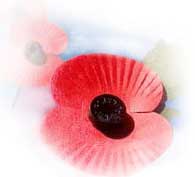

On 3 November 1917 Owen and Sassoon had dinner together one last time. Owen then boarded the midnight train at Waverley Station bound for London. Owen was posted to the reserve battalion of the Manchester Regiment at Scarborough. He was passed fit for service in June 1918 and returned to the Front as an officer reinforcement in September 1918. He was awarded the Military Cross in October 1918, but on 4 November 1918, just seven days before the Armistice, he was caught in a German machine gun attack and killed while attempting to lead his company across the Sambre Canal — he was twenty-five years old.
Wilfred
Owen was a poet of immense compassion and wisdom whose deft manipulation of
sound and the rhythmic use of words enabled him to use poetry as a means of
understanding and reconciliation. He wrote of war and the pity of war, however
he was more than a war poet - he was a spokesman for his generation.